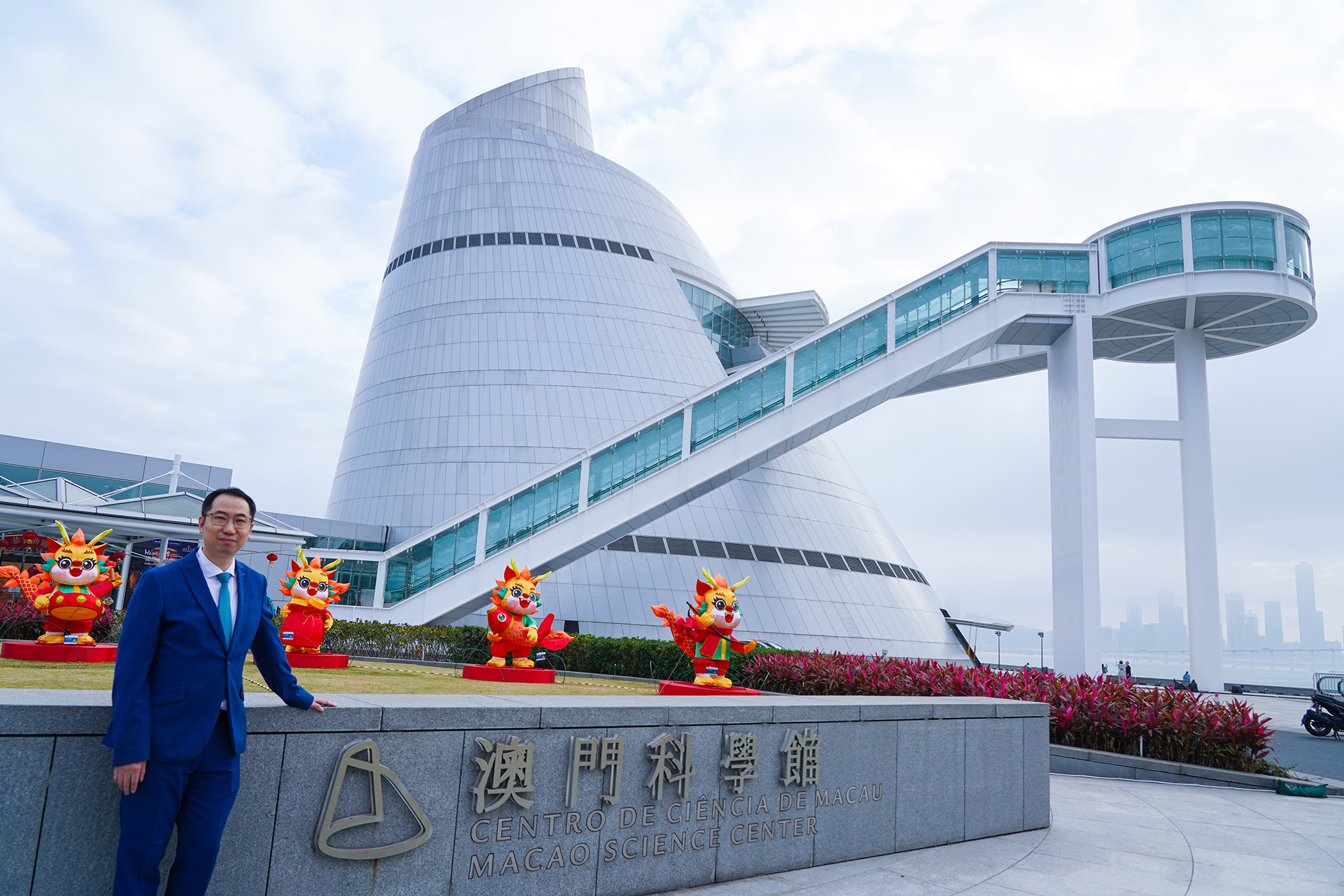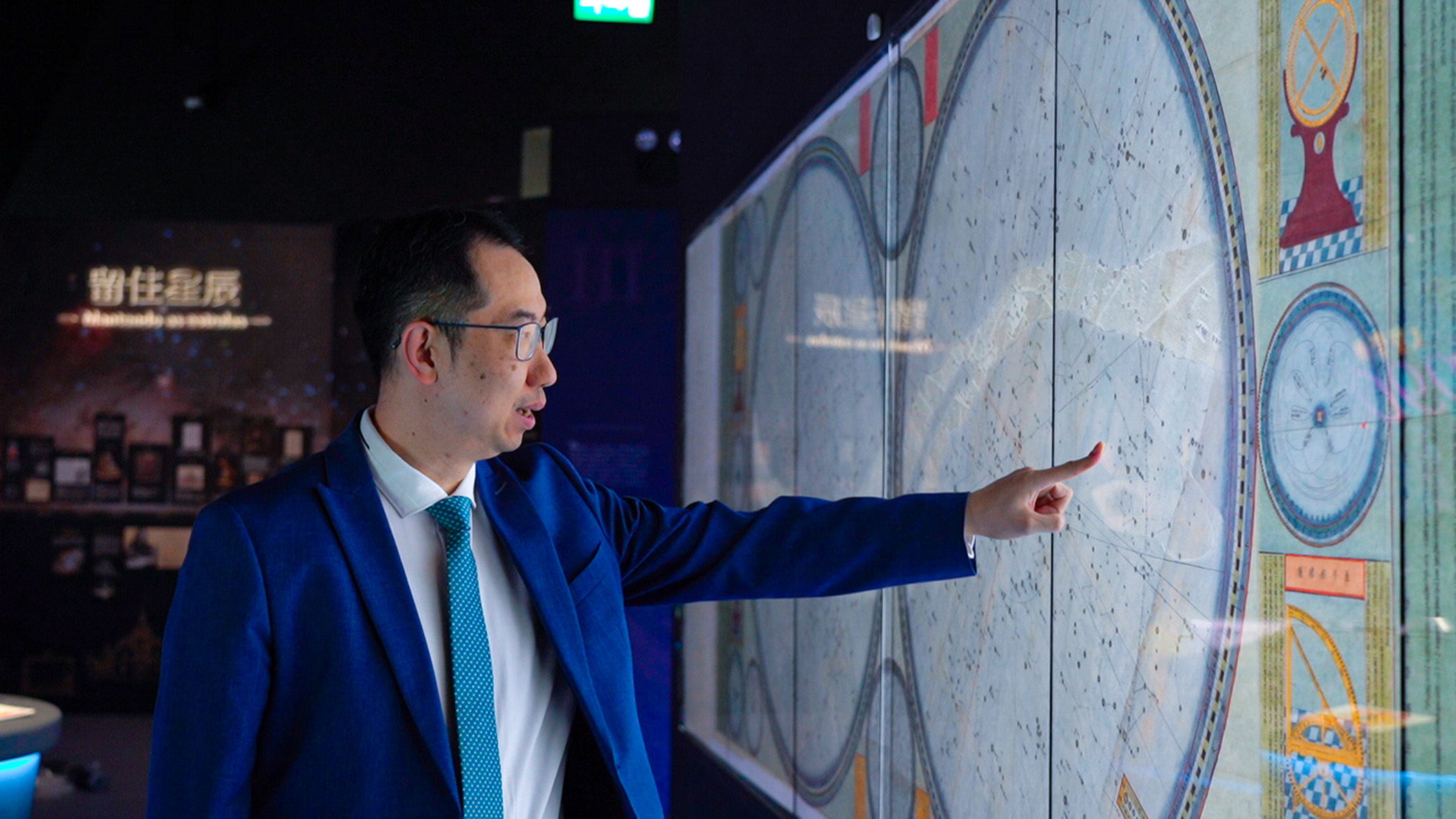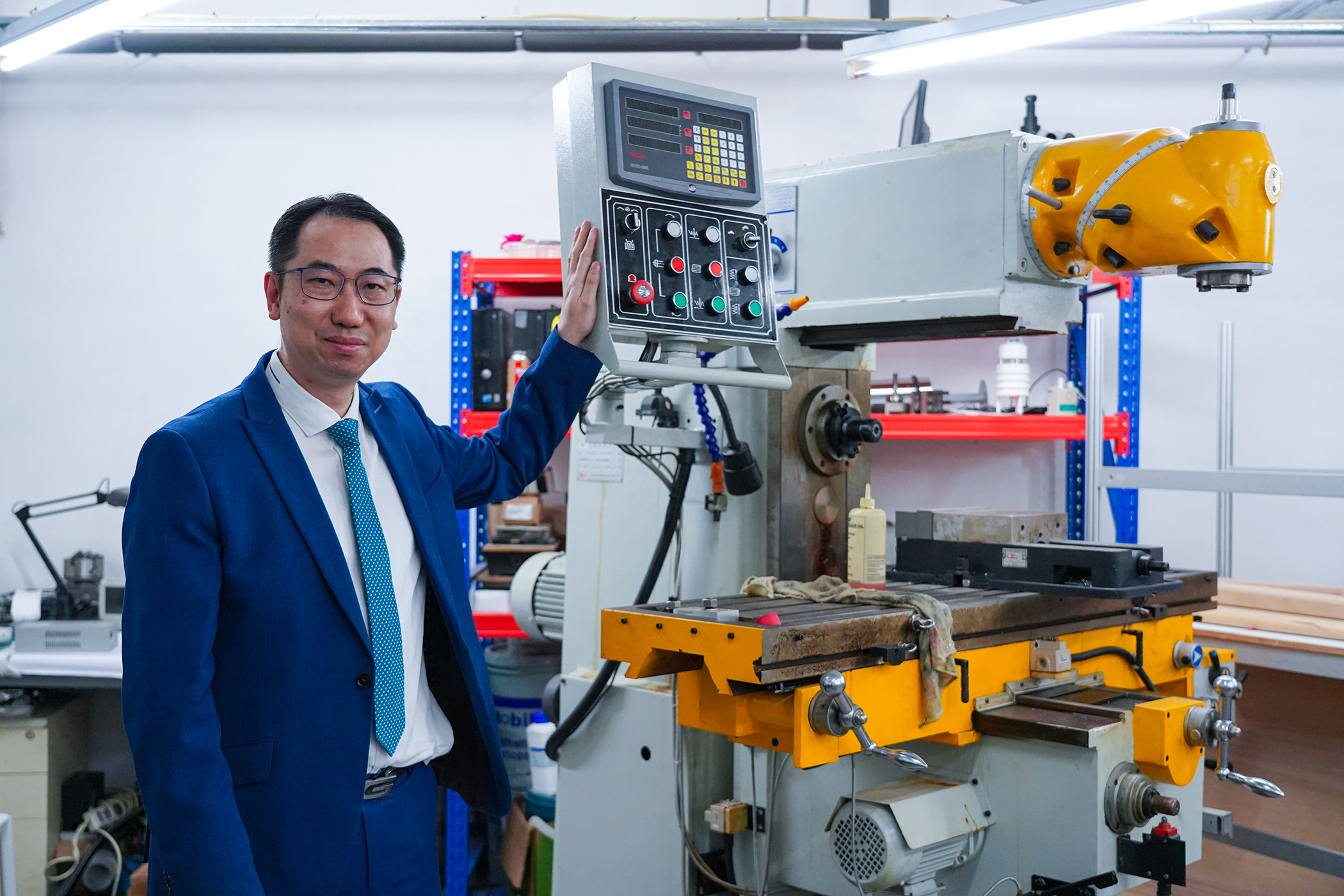University of Macau is a Pivotal Starting Point in Life
Dr. Sio Hon Pan, the Curator of the Macao Science Centre, graduated from the Faculty of Science and Technology (FST) at the University of Macau (UM), where he studied in the Department of Electrical and Computer Engineering (formerly the Department of Electrical and Electronic Engineering) in 1998. He holds a Master of Laws and a Ph.D. in Data Science. He is a licensed government engineer, a member of the Royal Institution of Chartered Surveyors (MRICS) in the United Kingdom, and a professional mediator in the International Commercial Mediation of the China International Economic and Trade Arbitration Commission. He has been recognized with prestigious accolades such as being named one of the “top ten outstanding youth of guangfu people in the world” and receiving “the 2nd national innovation pioneer award”.
Dr. Sio also has extensive experience in planning and managing large-scale venue facilities. After graduating, he participated in several major projects, including the Coloane Power Plant B, the Macau University of Science and Technology, the Government Harbor Building, and the Government Headquarters. From 2002 to 2007, he joined the Macao Organizing Committee of the East Asian Games and was involved in the main work of the 4th East Asian Games, the Lusophone Games, and the 2nd Asian Indoor Games. During this period, he was responsible for planning, coordinating construction, and managing the operation of several large venues, including the Macau Polytechnic Institute Sports Hall, the Macau International Shooting Center, the Bowling Center, and the Tennis School. He also served as the first director of the Macao East Asian Games Dome and the director of Macao Olympic Aquatic Center. Since assuming the role of the Curator of Macao Science Center in 2012, Dr. Sio has consistently driven the center to actively promote scientific popularization activities not only in Macau but also in Mainland China and various other countries, achieving remarkable results.
In an exclusive interview with FST, Dr. Sio reflected on how his university education significantly influenced his career development. He expressed his heartfelt gratitude, stating, “I sincerely thank UM, especially FST, for providing me with the opportunity to study electrical and electronic engineering. This not only equipped me with the foundational qualifications to become a power engineer but also served as a pivotal starting point in my professional journey.” He underscored that the university life taught him how to systematically acquire new knowledge and apply learned technologies to solve real-world problems, embodying a disciplined yet open-minded approach to learning that has profoundly impacted his subsequent work experiences.
Application of University Knowledge in Practice
Dr. Sio highlighted that the specialized knowledge and systematic learning methods he acquired during his university years played a critical role both in his initial job designing transformers and later when serving as the director of multiple large-scale venues. He shared a memorable incident from his tenure as the director of the Macao East Asian Games Dome, where the ice skating rink suffered from melting due to programming errors in the air conditioning system’s main unit. Faced with the prospect of a two-week wait or more if the manufacturer were to come to Macau for repairs, Dr. Sio and his team promptly applied their university-acquired knowledge of Programmable Logic Controllers (PLCs) to identify and rectify the issue within just four hours. This experience vividly demonstrated to him the practical value of university education in real work scenarios.
Moreover, during his time as the director of the Olympic Aquatic Centre, he encountered technical challenges, including a Dutch-imported pool floor lift mechanism that was unique to Macau and its surrounding areas. On the eve of a diving competition, this complex system malfunctioned, and Dutch engineers could not immediately arrive to resolve the problem. Leveraging his university-taught expertise and engineering mindset, Dr. Sio led his team to dismantle the equipment, pinpointed issues involving the PLC control logic, and successfully repaired the imbalanced hydraulic axis control of the lift’s limbs. By reprogramming and adjusting the control system, they ensured the diving platform operated accurately to the required depth, eliminating the technical hurdle for the impending event. He emphasized that many industrial applications he encountered resembled concepts he had studied at university, although their relevance was not fully recognized until faced with real-life situations. The university not only imparted solid technical skills but more importantly, cultivated the ability to tackle practical problems.
Reflecting on other aspects of his academic journey at the Faculty of Science and Technology, Dr. Sio mentioned participating in a young researcher paper contest organized by IEEE (Institute of Electrical and Electronics Engineers) at City University of Hong Kong. This experience further deepened his understanding of the research process and enhanced his proficiency in paper writing and the overall research workflow. Additionally, he chose to intern at Macau’s largest telecommunications company, gaining insights into the genuine demands of technology companies and translating theoretical knowledge into practical ICT solutions, which greatly influenced his future career path. His part-time work at the university library also honed his information processing skills and organizational management abilities. He stressed the importance of part-time jobs for students, as these hands-on experiences contribute significantly to their holistic development and have a positive impact on his future career.
Challenges and Opportunities in Scientific Popularization
Regarding the role and value of science centers in today’s society, Dr. Sio explicitly stated that the core mission of a science center is to enable the public to understand, experience, and apply science, thereby enhancing the general scientific literacy and promoting societal progress and human advancement. In the era of information overload, promoting scientific popularization faces challenges like dwindling public attention and diverse, customized content requirements. Dr. Sio advocates using new media tools, interactive lifestyle activities, and experiential teaching methods to cater to different age groups and backgrounds with tailored science popularization content, sparking their interest and curiosity in science. It is crucial to maintain credibility in science popularization content by ensuring it is verified and reviewed by professionals, thus establishing a trustworthy brand.
Looking ahead to the future development of the Science Center, Dr. Sio envisions it becoming a favored destination for youth to engage in scientific inquiry and inspire more young people to join the technology industry, fostering a vibrant ecosystem that cherishes science and pursues technological advancements.
Words of Wisdom for Current Students
While sharing his experiences and challenges at the Science Center, Dr. Sio did not forget to offer valuable advice to the current students at FST and UM. He encouraged them to cherish their time at the university, be bold in exploration and innovation, and actively participate in internships and research projects to gain invaluable experience and broaden their horizons. He reminded them, “In the rapidly evolving technology era, nurture a strong thirst for knowledge and curiosity, constantly learn new knowledge and technologies, and enhance interdisciplinary research capabilities to confront the complex and ever-changing challenges of the future.”
Furthermore, Dr. Sio underscored the significance of teamwork, encouraging students to build robust networks and leverage the resources provided by the university while supporting and growing together with peers. He advised, “As you strive for professional success, do not underestimate the power of networking; it will be an indispensable asset in your career journey.”
In conclusion, Dr. Sio Hon Pan earnestly hopes that every student will uphold the spirit of a scientist characterized by patriotism, dedication, pragmatism, innovation, collaboration, and nurturing talents. He believes that through persistent efforts and determination, the new generation of scientific and engineering talents will shine brightly in their respective career paths, contributing to the advancement of science and technology in Macau and beyond. He trusts that with unwavering effort and commitment, each student will create their own successful story in the realm of science and engineering.
澳大乃人生重要起點
澳門科學館館長邵漢彬博士於1998年畢業於澳門大學科技學院第七屆電機及電腦工程系(前電機與電子工程系),獲法律碩士及數據科學博士,具備政府執業工程師、英國皇家特許測量師(MRICS)及中國國際調解仲裁院國際商事調解員專業資格。過去曾榮膺世界廣府人「十大傑出青年」及「第二屆全國創新爭先獎狀」。
這位卓有貢獻的校友還擁有豐富的大型場館設施規劃管理經驗,畢業後曾參與路環發電廠B廠、澳門科技大學、政府海港樓及禮賓府等多個大型項目。2002年至2007年,加入東亞運動會澳門組織委員會,參與第四屆東亞運動會、葡語系國家運動會及第二屆亞洲室內運動會的主要工作。期間負責規劃、統籌興建及管理營運多個大型場館,包括澳門理工學院體育館、澳門國際射擊中心、保齡球中心及網球學校等,更曾擔任首任澳門東亞運動會體育館(澳門蛋)館長及奧林匹克游泳館館長。
自2012年獲委任為科學館館長至今,邵漢彬博士一直積極引領澳門科學館在本地、內地乃至不同國家積極推廣科學普及活動,對提升公眾科學素養產生了深遠影響。他也同時擔任澳門科學技術協進會理事長,澳門理工大學校董會常設委員會委員以及多個國際及地區組織的委員,邵博士的工作足跡跨越科研、科普與科創三大領域,為科研事業的蓬勃發展以及澳門社會整體進步作出了不可或缺的重要貢獻。
在接受澳大科技學院專訪時,他回顧了澳大學習生涯對其職業發展產生的巨大影響,他表示:「我由衷感謝澳門大學,尤其是科技學院,為我提供了學習電氣與電子工程的機會,這不僅賦予了我成為電力工程師所需的專業基礎,更為我的職業生涯搭建了重要起點。 」他強調大學時期的學習經驗教曉他如何系統性地獲取新知,並應用所學的技術解決問題 ,這種嚴謹而開放的求知態度與實踐精神對他日後的工作產生了深遠的影響。
大學知識的實際應用
邵漢彬博士指出,大學時期所學到的專業知識和系統化學習方法,在他首份變壓器設計工作以及後來擔任多個大型場館的館長期間起到了關鍵作用。邵漢彬博士分享了一段他擔任澳門蛋館長時至今仍記憶猶新的經歷,當時澳門蛋溜冰場因空調主機編程錯誤導致冰塊融化,若廠家到澳門維修,將消耗時兩個星期以上。他說:「在此關鍵的時刻,我和我的團隊隨即運用大學所學到的可程式邏輯控制器 (PLC, Programmable Logic Controller) 相關知識,僅用四小時就成功找到並修復問題並化解危機,這讓我深深體會到大學教育所培養的能力在實際工作中的價值所在。」此外,在擔任奧林匹克遊泳館館長期間,他也面臨一些技術性挑戰,當時遊泳館中配備了一個由荷蘭引進的,具有升降功能的池底升降台,那是在澳門乃至周邊地區均屬罕見。但在跳水比賽即將舉行之際,相關系統卻出現故障,而荷蘭工程師無法立即到現場解決問題時,邵漢彬博士利用大學所學的專業知識和工程思維,迅速找到問題核心。他帶領團隊深入研究,拆解設備並發現其中涉及可程式邏輯控制器 (PLC, Programmable Logic Controller)控制邏輯的問題,憑借在大學時期對該類技術的理解,成功解決了升降跳水台的四肢油壓軸控制失衡問題。最終透過重新編程和調整控制系統,確保跳水台能夠精準地達到所需深度,為即將舉行的比賽排除了技術障礙。他分享道: 「很多工業上應用的案例其實早在大學時期早已經教過了,可能我們當時並未意識到。但當面臨問題時,會察覺原來是似曾相識的東西。」他進一步強調大學不僅提供紮實的專業技能培訓,更關鍵的是鍛煉了解決實際問題的能力。回顧自己職業生涯中兩次成功解決關鍵技術難題的經歷,也令他深深體驗到前所未有的滿足感,同時也彰顯出澳大專業技能教育對其職業發展產生的深遠影響和寶貴價值。
談及科技學院學習生涯中其他經歷時,邵漢彬博士表示他曾有幸參加香港城市大學舉辦的電氣與電子工程師協會(IEEE, Institute of Electrical and Electronics Engineers)舉辦的青年論文比賽,並且通過這次經驗進一步深化了對科研過程的理解,提升了論文製作和科研整體流程的掌握能力。此外,他在大學期間選擇去澳門最大的電訊公司實習,讓他在實踐中了解客戶對於科技企業需求的真實面貌,並將理論知識轉化為實際的ICT解決方案,這對其日後職業生涯產生了深遠影響。邵博士過去也在澳大圖書館擔任兼職工作,在圖書館的經歷使他了解圖書館編目的運作,提升信息處理技能和組織管理能力,因此,他也強調大學生兼職工作的重要性,這些都是寶貴的實踐經驗,促進個人全面發展方面,對日後職業生涯也會產生積極影響。
科普推廣的挑戰與機遇
對於科學館在當今社會的角色和價值,邵博士明確表示:「科學館的核心使命是讓大眾能夠認知、體驗並應用科學,從而提升全民科學素質,進而促進社會文明和人類進步。」在當今信息爆炸的時代,推廣科普除了面臨大眾對科普注意力減少、推廣過程中所需的多樣性和定制化需求等挑戰,邵博士認為應利用新媒體手段、生活化的互動活動和體驗式教學,針對不同年齡層和背景的公眾提供定特訂的科普內容,激發他們對科學的興趣和探索欲望。同時要確保科普內容的可信度,努力打造可信賴的科普品牌,發佈經過專業人員核實與審核的信息,讓大眾知道這些科普資源是權威且可靠的。邵博士也談到了未來科學館的發展期望:「我們希望科學館能成為青少年熱愛並積極參與科學探究的理想場所,同時培育出更多的年輕人投身科技產業,形成一個持續喜愛科學、追求科技進步的良好科普環境。」
對澳大師弟師妹建言
邵漢彬博士在分享自身經歷與科學館工作挑戰的同時,也不忘對澳門大學科技學院的學弟學妹們提供寶貴建議。他勉勵在校的師弟師妹們珍惜在澳大學習的黃金時光,勇於探索、敢於創新,積極參與實習項目和科研活動,從中獲取寶貴經驗並拓寬視野。他表示:「面對瞬息萬變的科技時代,要保持旺盛的求知欲和好奇心,不斷學習新知與技術,提升跨學科研究能力,好應對未來複雜多變的挑戰。」邵博士進一步強調了團隊合作的重要性,鼓勵學弟學妹們建立良好的人際網絡,利用學校提供的各種資源,與師兄師姐互相支持、共同成長。他提醒道:「在追求專業成就的道路上,要充分利用母校豐富的資源和師兄師姐網絡,不要忽視人脈資源的力量,它將成為你職業生涯中不可或缺的助力。」最後,邵博士殷切期盼每一位學弟學妹都能夠秉承「愛國、奉獻、求實、創新、協同、育人」的科學家精神,在科學與工程領域持續發光發熱,為澳門、甚至全球的科技進步做出貢獻。他相信通過不懈努力和堅持,新一代的科學與工程人才必能在各自的職業道路上創造出屬於自己的成功故事。




